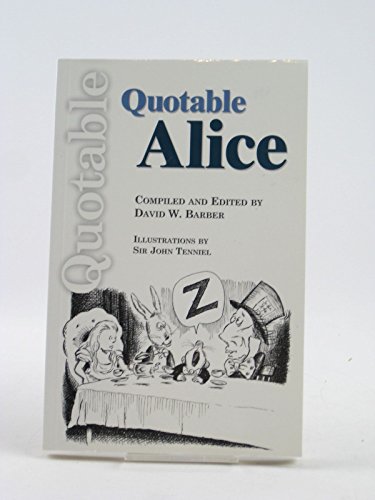Items related to Quotable Alice (Quotable Books)

Synopsis
Lewis Carroll's two great Alice stories -- Alice's Adventures in Wonderland and Through the Looking-Glass -- have entertained and amused both small children and grown adults alike for nearly a century and a half. Set in Victorian England, these wild, remarkable flights of fancy have had a lasting appeal to the world over and are surprisingly modern in their outlook. With Alice's adventures, which take her down a rabbit-hole to Wonderland or through a mirror into a fantastical game of chess, Carroll tells stories that are amusing and witty, but also surprisingly insightful and profound. Many of Carroll's phrases and expressions -- "Curiouser and curiouser," or "Why, sometimes I've believed as many as six impossible things before breakfast" -- have entered the language of everyday use.
In Quotable Alice, David W. Barber, whose books include Bach, Beethoven and the Boys and Better Than It Sounds: A Dictionary of Humorous Musical Quotations, brings together the best and most memorable of Carroll's pithy expressions from the Alice books. With the text is a selection of the famous illustrations John Tenniel created for the original editions.
"synopsis" may belong to another edition of this title.
About the Author
David Barber is a journalist, author, composer and performer who lives and works in Toronto.
"About this title" may belong to another edition of this title.
FREE shipping within U.S.A.
Destination, rates & speedsSearch results for Quotable Alice (Quotable Books)
Quotable Alice (Quotable Books)
Seller: SecondSale, Montgomery, IL, U.S.A.
Condition: Good. Item in good condition. Textbooks may not include supplemental items i.e. CDs, access codes etc. Seller Inventory # 00090606989
Quantity: 1 available
Quotable Alice (Quotable Books)
Seller: Gulf Coast Books, Cypress, TX, U.S.A.
paperback. Condition: Good. Seller Inventory # 0920151523-3-32797552
Quantity: 1 available
Quotable Alice (Quotable Books)
Seller: HPB Inc., Dallas, TX, U.S.A.
Paperback. Condition: Good. Connecting readers with great books since 1972! Used books may not include companion materials, and may have some shelf wear or limited writing. We ship orders daily and Customer Service is our top priority! Seller Inventory # S_283640281
Quantity: 1 available
Quotable Alice (Quotable Books)
Seller: ThriftBooks-Dallas, Dallas, TX, U.S.A.
Paperback. Condition: Very Good. No Jacket. May have limited writing in cover pages. Pages are unmarked. ~ ThriftBooks: Read More, Spend Less 0.45. Seller Inventory # G0920151523I4N00
Quantity: 1 available
Quotable Alice (Quotable Books)
Seller: ThriftBooks-Dallas, Dallas, TX, U.S.A.
Paperback. Condition: As New. No Jacket. Pages are clean and are not marred by notes or folds of any kind. ~ ThriftBooks: Read More, Spend Less 0.45. Seller Inventory # G0920151523I2N00
Quantity: 1 available
Quotable Alice : From the Works of Lewis Carroll
Seller: About Books, Henderson, NV, U.S.A.
Paperback. Condition: As New condition. Tenniel, John; cover art by Kevin Reeves (illustrator). First Printing of the First Edition. Toronto, Canada: Quotable Books / Sound and Vision, 2001. 5.5" wide by 8.5" tall. No store stamp, owner's name or bookplate. No remainder marks. No underlining. No highlighting. No margin notes. Bright, shiny, clean, square, tight, unmarked copy. Flat spine. No creases. Fresh and crisp, apparently never read. "First Edition, August 2001" is so stated, with complete number row (1 through 15) on the copyright page. From the rear cover: "Lewis Carroll's two great Alice stories -- [ALICE'S ADVENTURES IN] WONDERLAND and its sequel THROUGH THE LOOKING-GLASS. set in Victorian England, these wild, remarkable flights of fancy have a lasting appeal the world over and are, in many ways, surprisingly modern in their outlook. Many of their phrases and expressions -- 'Curiouser and curiouser,' or 'Why, sometimes I've believed as many as six impossible things before breakfast' -- have entered the language of everyday use. IN QUOTABLE ALICE. David W. Barber. brings together the best and most memorable of Carroll's pithy expressions from the Alice books, complete with an index for easy reference. The text is wonderfully complemented with a selection of the famous illustrations John Tenniel created for the original editions.". First Printing of the First Edition. Soft Cover. As New condition. Illus. by Tenniel, John; cover art by Kevin Reeves. [vii], 118pp. . Seller Inventory # 003405
Quantity: 1 available
